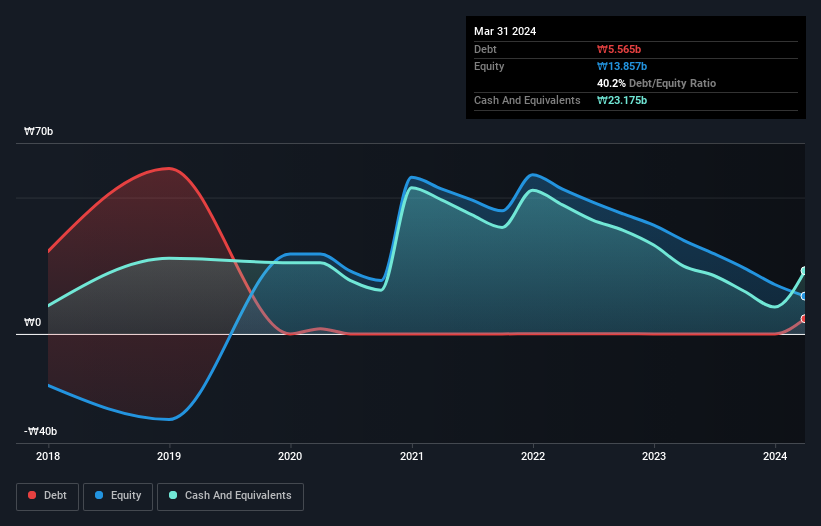Warren Buffett famously said, 'Volatility is far from synonymous with risk.' So it might be obvious that you need to consider debt, when you think about how risky any given stock is, because too much debt can sink a company. As with many other companies QuantaMatrix Inc. (KOSDAQ:317690) makes use of debt. But should shareholders be worried about its use of debt?
When Is Debt A Problem?
Debt assists a business until the business has trouble paying it off, either with new capital or with free cash flow. If things get really bad, the lenders can take control of the business. However, a more frequent (but still costly) occurrence is where a company must issue shares at bargain-basement prices, permanently diluting shareholders, just to shore up its balance sheet. Of course, plenty of companies use debt to fund growth, without any negative consequences. When we examine debt levels, we first consider both cash and debt levels, together.
See our latest analysis for QuantaMatrix
How Much Debt Does QuantaMatrix Carry?
The image below, which you can click on for greater detail, shows that at March 2024 QuantaMatrix had debt of ₩5.57b, up from none in one year. However, it does have ₩23.2b in cash offsetting this, leading to net cash of ₩17.6b.

A Look At QuantaMatrix's Liabilities
Zooming in on the latest balance sheet data, we can see that QuantaMatrix had liabilities of ₩22.0b due within 12 months and liabilities of ₩1.97b due beyond that. On the other hand, it had cash of ₩23.2b and ₩1.61b worth of receivables due within a year. So it can boast ₩865.4m more liquid assets than total liabilities.
This state of affairs indicates that QuantaMatrix's balance sheet looks quite solid, as its total liabilities are just about equal to its liquid assets. So while it's hard to imagine that the ₩71.8b company is struggling for cash, we still think it's worth monitoring its balance sheet. Succinctly put, QuantaMatrix boasts net cash, so it's fair to say it does not have a heavy debt load! When analysing debt levels, the balance sheet is the obvious place to start. But it is QuantaMatrix's earnings that will influence how the balance sheet holds up in the future. So if you're keen to discover more about its earnings, it might be worth checking out this graph of its long term earnings trend.
Over 12 months, QuantaMatrix reported revenue of ₩3.5b, which is a gain of 161%, although it did not report any earnings before interest and tax. So there's no doubt that shareholders are cheering for growth
So How Risky Is QuantaMatrix?
By their very nature companies that are losing money are more risky than those with a long history of profitability. And the fact is that over the last twelve months QuantaMatrix lost money at the earnings before interest and tax (EBIT) line. And over the same period it saw negative free cash outflow of ₩18b and booked a ₩20b accounting loss. But at least it has ₩17.6b on the balance sheet to spend on growth, near-term. The good news for shareholders is that QuantaMatrix has dazzling revenue growth, so there's a very good chance it can boost its free cash flow in the years to come. High growth pre-profit companies may well be risky, but they can also offer great rewards. The balance sheet is clearly the area to focus on when you are analysing debt. However, not all investment risk resides within the balance sheet - far from it. Be aware that QuantaMatrix is showing 3 warning signs in our investment analysis , you should know about...
If, after all that, you're more interested in a fast growing company with a rock-solid balance sheet, then check out our list of net cash growth stocks without delay.
Valuation is complex, but we're here to simplify it.
Discover if QuantaMatrix might be undervalued or overvalued with our detailed analysis, featuring fair value estimates, potential risks, dividends, insider trades, and its financial condition.
Access Free AnalysisHave feedback on this article? Concerned about the content? Get in touch with us directly. Alternatively, email editorial-team (at) simplywallst.com.
This article by Simply Wall St is general in nature. We provide commentary based on historical data and analyst forecasts only using an unbiased methodology and our articles are not intended to be financial advice. It does not constitute a recommendation to buy or sell any stock, and does not take account of your objectives, or your financial situation. We aim to bring you long-term focused analysis driven by fundamental data. Note that our analysis may not factor in the latest price-sensitive company announcements or qualitative material. Simply Wall St has no position in any stocks mentioned.
Have feedback on this article? Concerned about the content? Get in touch with us directly. Alternatively, email editorial-team@simplywallst.com
About KOSDAQ:A317690
Medium-low risk with worrying balance sheet.
Market Insights
Community Narratives



